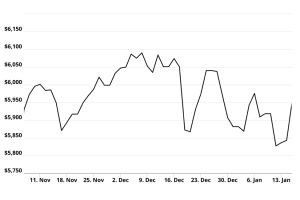
In recent times, the fascination with quantum computing has surged, driven by technological advancements and a notable uptick in investments. More and more companies and institutes are performing a comprehensive exploration of the quantum-computing landscape and searching for use cases. Along these lines, investors are seeking to better understand quantum computing stocks and how they will affect various sectors.
For instance, there has been a lot of focus on the pharmaceutical industry in recent years. This industry has been affected by quantum computing through the recruitment of quantum scientists. They have set out to explore potential applications like quantum simulation in drug design.
Moreover, quantum technology holds significant implications for the financial-services sector. Particularly in the realm of security, signifying its potential to reshape how businesses and industries operate.
Here are three leading quantum computing stocks that could lead the next tech revolution.
International Business Machines (IBM)

International Business Machines (NASDAQ:IBM) is probably the safest bet on quantum computing. And arguably one of the top quantum computation stocks one should own. IBM operates in various domains, including cloud computing, artificial intelligence and data analytics.
With a global presence, IBM provides solutions and services to enterprises, leveraging its expertise in cutting-edge technologies. Most recently, the company has increased its focus on AI and machine learning applications.
Through the IBM Quantum Network, the company collaborates with over 250 Fortune 500 companies, universities, labs. and startups. The network fosters partnerships and providing exclusive access to meetings and channels. In addition, it also facilitates collaborative efforts and close interactions with IBM’s internal experts.
Most recently, IBM introduced the IBM Quantum Heron, marking the first in a new series of utility-scale quantum processors. Engineered over four years, it boasts IBM’s highest performance metrics and lowest error rates among its quantum processors.
Furthermore, IBM unveiled the Quantum System Two, its inaugural modular quantum computer. The system is operational with three IBM Heron processors and associated control electronics, representing a significant step in IBM’s quantum-centric supercomputing architecture.
Quantum Computing (QUBT)

Quantum Computing (NASDAQ:QUBT) is the pure-play name to own in the quantum computing sector. QUBT aims to provide widely accessible and cost-effective quantum solutions for real-world business applications.
The company’s model is based on vendor-neutral software and ready-to-run systems. These offer business users immediate access to various quantum processing units and quantum technologies.
The acquisition of QPhoton, a quantum photonics innovation company, enhances QUBT’s capabilities with a series of quantum photonic systems (QPS). The integration of Quantum’s flagship software, Qatalyst, with QPhoton’s QPS positions the company to provide a widely accessible and cost-effective quantum solution.
Quantum achieved a significant milestone recently in commercializing its cutting-edge computing technologies, securing hardware sales of its Reservoir Computer and Quantum Random Number Generator. The Reservoir Computer reportedly exhibits exceptional speed and efficiency. These properties allows it to enhance data analysis and machine learning as well as other applications.
In Q3 2023, QUBT reported an earnings per share negative 11 cents. While this metric was up over 50% year-over-year, the aforementioned technological milestones are anticipated to bring a further boost to EPS, and QUBT’s future prospects overall.
Microsoft (MSFT)

The Redmond-based tech titan has made significant efforts in the last decade to diversify its product family and become less dependent on the sales of software products. In addition to cloud, gaming and AI, Microsoft (NASDAQ:MSFT) has also made significant strides to improve its understanding of quantum computing technology.
For instance, the company works to highlight its work on Azure Quantum. Azure’s aim is to achieve scalability towards the realization of a general-purpose quantum computer. Along these lines, Azure Quantum applications are crafted to empower quantum chemists and scientists in their research endeavors.
More precisely, the tech giant says it is actively working to achieve quantum at scale by developing a stable qubit, and introducing a comprehensive, fault-tolerant quantum machine to Azure. To aid these efforts MSFT is working with a long-term approach through its lab at the University of Sydney. The lab is trying to develop quantum computers at the scale needed for applications with real impact. The project is headed by Dr. David Reilly, who has already developed a cryogenic quantum control platform.
On the date of publication, Shane Neagle did not hold (either directly or indirectly) any positions in the securities mentioned in this article. The opinions expressed in this article are those of the writer, subject to the InvestorPlace.com Publishing Guidelines.




